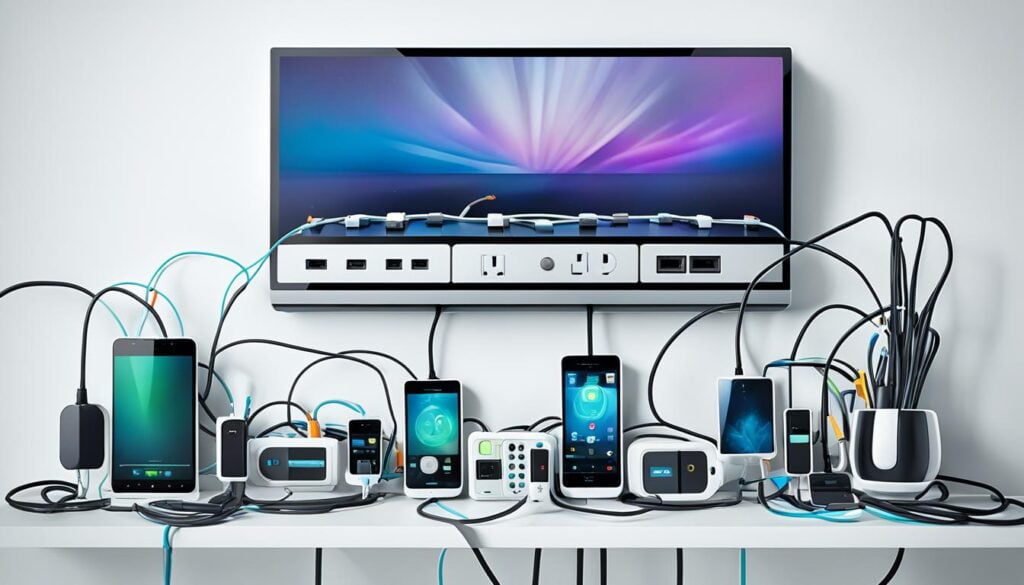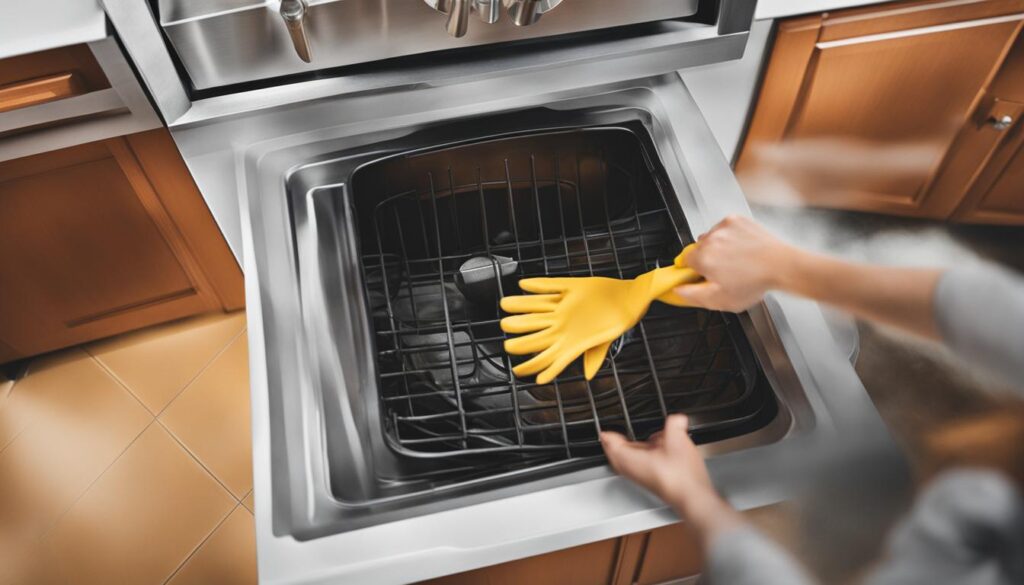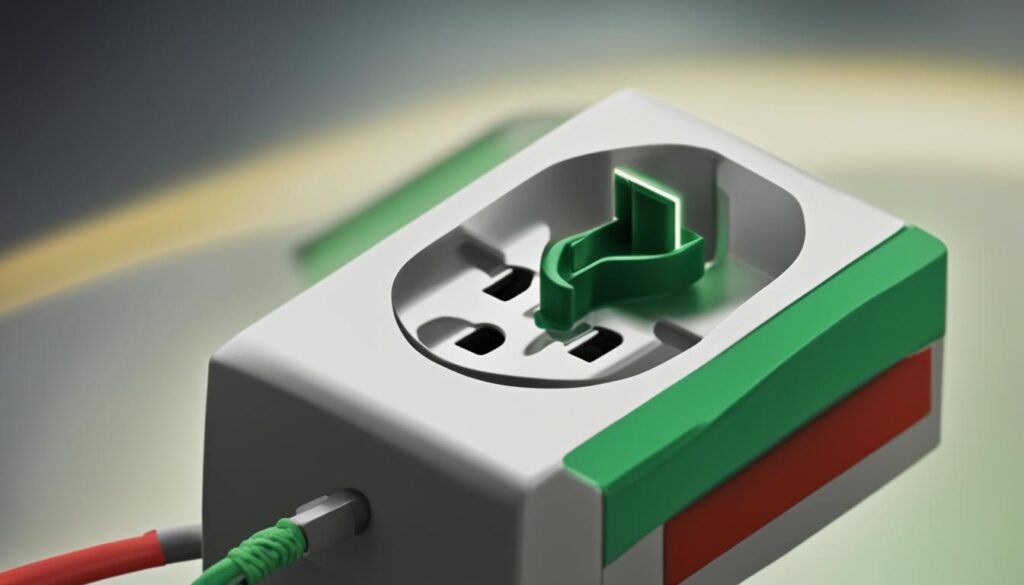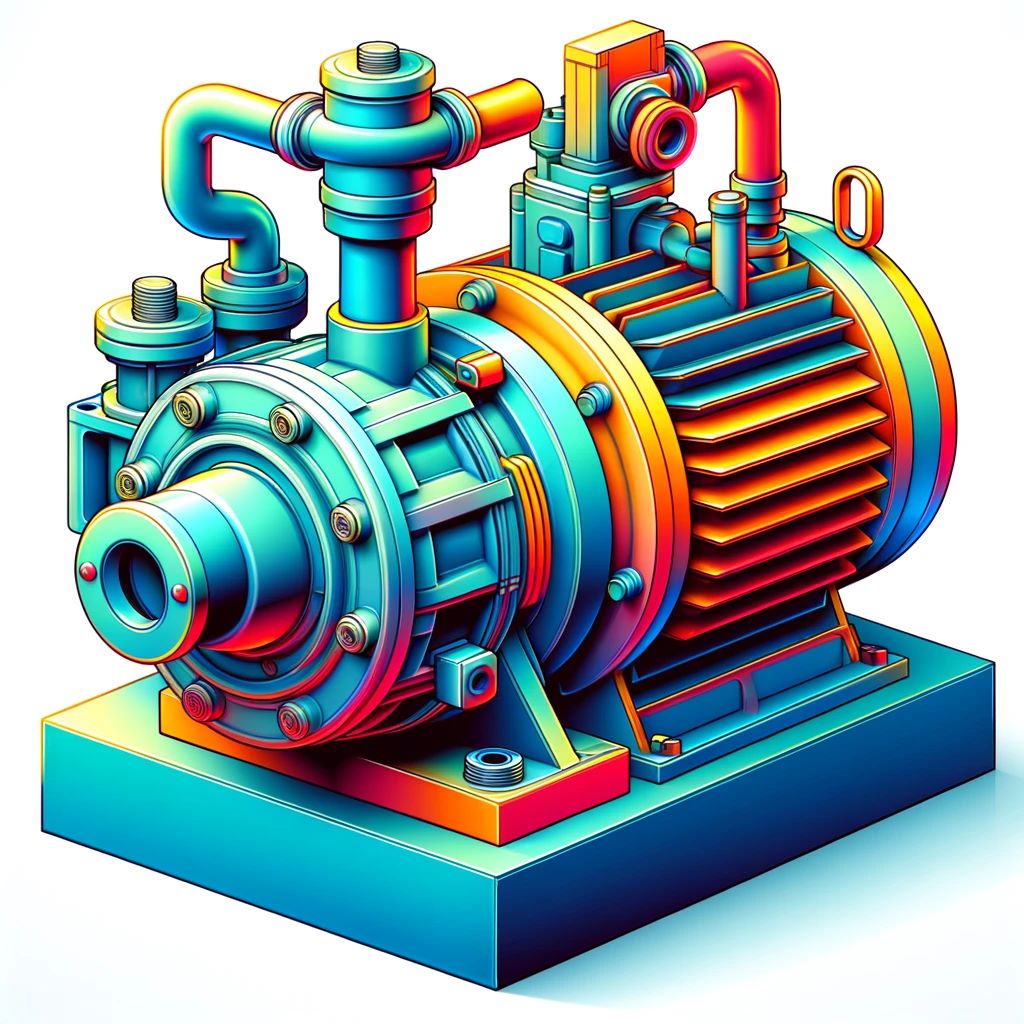This post contains affiliate links.
Did you know that electrical hazards account for approximately 51,000 fires and $1.3 billion in property damage in the United States each year? Ensuring electrical safety at home is not only essential for protecting your property, but also for safeguarding the health and well-being of your loved ones. By following a few simple precautions, you can reduce the risk of electrical accidents and create a safe environment for everyone in your household.
Key Takeaways:
- Reading appliance instructions and following electrical safety measures are crucial for a safe home environment.
- Prevent overloaded outlets and replace damaged cords to reduce the risk of fires and electrical shock.
- Proper cord management, such as avoiding running cords under rugs and furniture, helps prevent accidents.
- Keep electrical devices and outlets away from water and ensure proper air circulation for appliances.
- Using the correct wattage bulbs and being aware of potential hazards with heaters and water heaters are important for electrical safety.
Appliance Safety Tips for Electrical Safety at Home
When it comes to electrical safety, paying attention to appliance safety is crucial. Following proper appliance instructions, detecting electrical shocks, avoiding overloaded outlets, and addressing damaged electrical cords are essential steps to ensure a safe home environment.
Reading and adhering to appliance instructions is the first line of defense against potential electrical hazards. These instructions provide valuable information on how to operate appliances safely and efficiently, reducing the risk of accidents.
If you experience even a slight electrical shock from an appliance, it is important to act swiftly. Stop using the appliance immediately and have it checked by a qualified electrician. Ignoring electrical shocks can lead to more serious consequences, including electrocution or fires.
Overloaded outlets can result in electrical problems and increase the risk of fires. Take the time to assess all outlets in your home for signs of overloading. Ensure that the number of devices connected to a single outlet does not exceed its capacity. Consider using power strips with built-in overload protection to prevent these risks.
Another critical aspect of appliance safety is addressing damaged electrical cords. Frayed or cracked cords can expose wires, posing a significant electrocution and fire hazard. Regularly inspect all electrical cords and promptly replace or repair any that show signs of damage.
Additionally, it is important to properly manage power cords to avoid potential accidents and damage. Avoid stapling or running cords under rugs or furniture, as this can lead to fraying or overheating. Instead, use cord organizers or cable clips to keep cords neat and securely in place.
Remember, proper appliance safety practices can go a long way in preventing electrical accidents and ensuring the well-being of your household.
By following these appliance safety tips, you can help create a safer home environment:
- Read and follow appliance instructions carefully
- Stop using appliances that give electrical shocks and have them checked by a professional
- Regularly inspect outlets for signs of overloading
- Replace or repair damaged electrical cords promptly
- Avoid stapling or running cords under rugs or furniture
Keeping these practices in mind will not only protect you and your loved ones from electrical accidents but also promote a safer and more secure living space.
| Common Appliances | Tips for Electrical Safety |
|---|---|
| Refrigerators | Ensure proper ventilation for the cooling system Regularly clean dust from the condenser coils |
| Ovens and Stoves | Never leave them unattended while in use Keep flammable materials away from heat sources |
| Washing Machines | Inspect hoses for leaks or cracks regularly Avoid overloading the machine to prevent strain on electrical components |
| Dryers | Clean the lint filter after each use Ensure proper venting to prevent lint buildup and potential fires |
| Microwaves | Avoid using metal objects or containers in the microwave Follow specific heating instructions for different food items |
Proper Cord Management for Electrical Safety
Proper cord management is essential for maintaining electrical safety in your home. By following these cord management tips, you can minimize the risk of hazards such as electrical shocks, fires, and power surges.
Firstly, avoid relying on extension cords for long-term use. While they may be convenient, extension cords are intended for temporary use only. If you find yourself relying on extension cords frequently, consider having additional outlets installed by a qualified electrician.
When it comes to power cords, regularly inspect them for signs of fraying or cracking. Damaged cords can pose a serious safety hazard and should be replaced immediately. Additionally, avoid storing power cords under rugs or tightly wrapping them around objects, as this can lead to overheating and damage.
Unplugging unused appliances is not only an energy-saving practice but also a safety measure. When appliances are left plugged in, they can be vulnerable to power surges and potential overheating. By unplugging unused devices, you not only reduce the risk of electrical accidents but also minimize the power load on your home’s electrical system.
Expert Tip:
“Keep your cords organized and tangle-free by using cord organizers or cable ties. This not only helps with cord management but also prevents tripping hazards caused by loose cords.”
By incorporating these cord management practices into your daily routine, you can create a safer environment for you and your family. Remember, cord management is an essential part of electrical safety and should not be overlooked.

Water and Electricity: A Dangerous Combination
Water and electricity are a dangerous combination that should always be kept separate to prevent damage to appliances and reduce the risk of personal injury. It’s important to understand the potential hazards associated with electrical equipment and water to ensure a safe home environment.
When it comes to electrical equipment and water, precautions need to be taken to avoid any contact between the two. Electrical devices such as kitchen appliances, bathroom fixtures, and outdoor equipment should be kept dry and away from any sources of water.
Additionally, it’s crucial to have dry hands when working with electrical appliances to minimize the risk of electric shock. Water can conduct electricity, making wet hands more susceptible to electric shock when coming into contact with live wires or electrical components.
To prevent overheating, proper air circulation is essential for all electrical equipment. It’s important to ensure that appliances have sufficient space around them for air to flow freely. Blocked ventilation can lead to overheating, which not only affects the performance of the equipment but also poses a fire hazard.
An often overlooked aspect of electrical safety is the cleaning of exhaust fans. Over time, dust and debris can accumulate in exhaust fans, reducing their efficiency and posing a fire hazard. Regular cleaning and maintenance of exhaust fans are necessary to ensure proper air circulation and prevent the buildup of flammable materials.
Danger of Water and Electricity
“Water and electricity are a dangerous combination. The risk of electric shock and the potential for damage to electrical equipment make it essential to keep them separate.”
Importance of Air Circulation
- Ensure proper air circulation around electrical equipment to prevent overheating.
- Blocked ventilation can lead to reduced performance and fire hazards.
Regular Cleaning of Exhaust Fans
- Clean exhaust fans regularly to prevent the buildup of dust and debris.
- Regular maintenance ensures proper air circulation and reduces fire hazards.

| Water and Electricity Precautions | Tips |
|---|---|
| Keep electrical equipment dry | Avoid placing electrical devices near water sources |
| Work with dry hands | Avoid handling electrical appliances with wet hands |
| Ensure proper air circulation | Leave sufficient space around electrical equipment for air to flow freely |
| Clean exhaust fans regularly | Prevent the buildup of dust and debris for optimal performance |
Proper Bulb Usage for Electrical Safety
When it comes to electrical safety, using the correct wattage bulbs in your lamps, fixtures, and appliances is crucial. Choosing the right bulbs not only ensures optimal performance but also reduces the risk of electrical hazards. Here are some important considerations to keep in mind:
1. Lamp and Fixture Wattage
Always check the wattage rating of your lamps and fixtures to determine the maximum bulb wattage they can safely handle. Using bulbs with wattages higher than the recommended limit can lead to overheating, fire hazards, and damage to the fixture. If a light fixture does not have a wattage listed, it is generally safe to use 60-watt bulbs or lower.
2. Benefits of LED Bulbs
LED (light-emitting diode) bulbs offer numerous advantages when it comes to electrical safety. Compared to traditional incandescent bulbs, LED bulbs consume less power and generate significantly less heat, reducing the risk of overheating and fire incidents. Additionally, LED bulbs have a longer lifespan, further contributing to energy savings and minimizing the need for frequent replacements.
| Bulb Type | Power Consumption | Heat Emission | Lifespan |
|---|---|---|---|
| Incandescent | Higher | Higher | Shorter |
| LED | Lower | Lower | Longer |
3. Heater and Water Heater Safety
Heating appliances, such as heaters and water heaters, should be used with caution to ensure both personal safety and electrical safety. Keep these considerations in mind:
- Follow the manufacturer’s instructions for proper usage, installation, and maintenance.
- Ensure the appliance is placed on a stable, non-combustible surface, away from any flammable materials.
- Keep a safe distance to prevent accidental contact and burns.
- Regularly inspect the appliance and its power cord for any damage or wear. Replace or repair any damaged components promptly.
By prioritizing proper bulb usage and following these safety guidelines, you can create a safer home environment and minimize the risk of electrical accidents and hazards.
Outdoor Electrical Safety Tips
When it comes to creating a safe home environment, outdoor electrical safety is crucial. Whether you’re setting up holiday lights or working on outdoor projects, it’s important to follow these tips to ensure your safety and the well-being of your loved ones.
Holiday Lights Safety
Before stringing up those festive lights, take a moment to inspect them for any signs of damage or wear. Frayed cords or broken bulbs can increase the risk of electrical shock or fire hazards. Always unplug the lights before leaving your home or going to bed, reducing the chances of accidents caused by electrical malfunctions.

Power Lines Safety
Power lines carry high voltage electricity and should always be avoided. Make sure to maintain a safe distance from power lines, especially when working with ladders, tall equipment, or conducting any outdoor activity that involves height. Accidental contact with power lines can have severe and potentially fatal consequences.
Cord and Outlet Safety
Proper use of cords and outlets is essential for outdoor electrical safety. Avoid overloading outlets with too many devices or appliances, as this can lead to overheating and electrical fires. Always use extension cords and power strips suitable for outdoor use, and make sure they are rated for the power load you require. Don’t forget to unplug and properly store unused cords and appliances to minimize potential risks.
“Outdoor electrical safety should never be taken lightly. By following these tips, you can enjoy your outdoor activities with peace of mind.”
By practicing these outdoor electrical safety tips, you can reduce the risk of electrical accidents and create a safer environment for everyone. Remember: inspect your holiday lights, avoid power lines, and use cords and outlets responsibly. By prioritizing outdoor electrical safety, you can enjoy the great outdoors without compromising on your well-being.
**Table: Outdoor Electrical Safety Checklist**
| Safety Tips | Importance Rating |
|——————————————|———————-|
| Inspect holiday lights for damage | High |
| Unplug lights when not in use | High |
| Stay away from power lines | High |
| Avoid overloading outlets | Medium |
| Use suitable extension cords | Medium |
| Properly store unused cords | Medium |
| Prioritize safety at all times | High |
Keep this checklist handy whenever you engage in outdoor electrical activities to ensure a safe and enjoyable experience.
Importance of Smoke Detectors for Electrical Safety
Smoke detectors play a crucial role in ensuring electrical safety in your home. They are designed to detect the presence of smoke early on, giving you and your family valuable time to evacuate in the event of a fire.
Installation and Placement
It is essential to install smoke detectors on every level of your home, including the basement and near sleeping areas. This ensures maximum coverage and early detection in case of a fire. By placing smoke detectors strategically, you enhance the safety of your household.
Maintenance and Testing
Regular maintenance and testing of smoke detectors are vital to ensure their proper functionality. It is recommended to test your smoke detectors at least once a month by pressing the test button. Additionally, make sure to replace the batteries annually or as soon as you hear the low battery alert sound.
Fire Escape Plan
Having a well-practiced fire escape plan is essential for the safety of everyone in your home. Ensure that all family members are familiar with the plan and know how to react in case of a fire. Conduct regular drills to practice evacuation routes and meeting points outside the house.
Did You Know? According to the National Fire Protection Association (NFPA), three of every five home fire deaths occur in homes without working smoke detectors.
Importance of Grounding and Circuit Breakers
When it comes to electrical safety, two crucial components are grounding and circuit breakers. Understanding their importance and ensuring their proper usage can significantly reduce the risk of electrical hazards in your home.
Grounding plays a fundamental role in preventing electrical shocks and fires. It involves providing a safe path for excess electrical current to flow into the ground. Without proper grounding, electrical faults can result in dangerous voltage surges, endangering both your electrical system and your personal safety. Grounding protects you by redirecting this excess current into the ground, preventing it from flowing through your body or causing electrical fires.
Circuit breakers are devices designed to protect electrical circuits from overloads and potentially dangerous situations. They serve as a safety net, detecting abnormal electrical currents and automatically interrupting the flow of electricity to prevent damage or fires. Circuit breakers can be reset after tripping, making them a convenient and efficient alternative to fuses. It is crucial to have circuit breakers properly labeled to identify the circuits they protect, enabling quick and safe troubleshooting.
Electrical Wiring Inspection
Ensuring the safety of your electrical system starts with a thorough inspection of your electrical wiring. This is especially important in older homes where outdated wiring may pose significant risks. Hiring a professional electrician to inspect your electrical system can identify potential hazards, such as faulty wiring, loose connections, or inadequate grounding. By addressing these issues promptly, you can ensure the safety and reliability of your electrical system.
GFCI Outlets for Added Safety
In wet areas, such as kitchens, bathrooms, and outdoor spaces, the risk of electrical accidents is higher. That’s where Ground Fault Circuit Interrupter (GFCI) outlets come into play. These specialized outlets have built-in sensors that can detect ground faults and immediately cut off the power supply, preventing electric shock. GFCI outlets are particularly important near water sources as they add an extra layer of protection to mitigate the risk of electrical accidents in these areas.
By prioritizing proper grounding and circuit breaker usage, as well as conducting regular electrical inspections and implementing GFCI outlets, you can significantly enhance the safety of your home’s electrical system. These preventive measures minimize the risk of electrical shocks, fires, and other accidents, providing you with peace of mind and a secure environment for you and your family.

Conclusion
Electrical safety is paramount in ensuring a secure home environment for you and your loved ones. By implementing the necessary precautions and following these essential home electrical safety tips, you can greatly reduce the risk of accidents and create a hazard-free space.
Throughout this article, we have explored various aspects of electrical safety, including appliance safety, proper cord management, the dangers of water and electricity, the significance of using the correct bulb wattage, outdoor electrical safety, the importance of smoke detectors, and the role of grounding and circuit breakers.
Remember, reading and following appliance instructions, avoiding overloaded outlets, replacing damaged cords, and keeping cords tidy are just some of the crucial steps to prevent electrical hazards. Additionally, being mindful of potential risks with water and electricity, using the correct wattage bulbs, implementing outdoor electrical safety measures, installing smoke detectors, and ensuring proper grounding and circuit breakers play significant roles in safeguarding your home.
Always prioritize safety and consult a qualified electrician if you are uncertain about any electrical issues. By taking these precautions seriously, you can create a safe and secure home environment for yourself and your loved ones.
FAQ
What are some electrical safety tips for a safe home environment?
There are several electrical safety tips to follow at home. These include reading appliance instructions, avoiding overloaded outlets, replacing damaged cords, keeping cords tidy, unplugging unused appliances, keeping electrical devices and outlets away from water, ensuring proper air circulation for appliances, cleaning exhaust fans, using the correct wattage in fixtures and appliances, and being aware of potential hazards with heaters and water heaters.
Why is it important to read and follow appliance instructions for electrical safety?
Reading and following appliance instructions is important to ensure proper electrical safety. This helps prevent accidents and ensures that appliances are used correctly.
What should I do if an appliance gives an electrical shock?
If an appliance gives even a slight electrical shock, it should be stopped and checked by a qualified electrician. This helps identify and fix any potential electrical issues.
How can I prevent overloaded outlets for electrical safety?
Overloaded outlets can be a common cause of electrical problems. It is important to check all outlets for signs of overloading and avoid plugging in too many appliances or devices into a single outlet.
What should I do if I have damaged electrical cords?
Damaged electrical cords should be replaced or repaired to prevent fires and electrocution. It is important to regularly check power cords for signs of fraying or cracking.
What is proper cord management and why is it important for electrical safety?
Proper cord management involves keeping cords tidy and avoiding running them under rugs or furniture. Extension cords should only be used on a temporary basis, and additional outlets should be installed by a qualified electrician if needed. This helps prevent tripping hazards and reduces the risk of electrical fires.
Why should I unplug unused appliances for electrical safety?
Unplugging unused appliances not only saves power but also protects them from overheating or power surges. It is a good habit to unplug appliances when not in use to avoid potential electrical problems.
Why should I keep electrical devices and outlets away from water?
Water and electricity should always be kept separate to prevent damage to appliances and reduce the risk of personal injury. Electrical equipment should be kept dry and away from sources of water. It is important to have dry hands when working with electrical appliances.
How does proper air circulation contribute to electrical safety?
Proper air circulation is essential for preventing overheating of electrical equipment. It is important to ensure that appliances have enough space around them for air to flow freely and that exhaust fans are regularly cleaned to prevent fire hazards.
What should I consider when using bulbs for electrical safety?
Using the correct wattage bulbs in lamps, fixtures, and appliances is important for electrical safety. If a light fixture has no wattage listed, 60-watt bulbs or less should be used. LED bulbs are recommended as they consume less power and reduce the risk of overheating.
How can I ensure outdoor electrical safety?
When using holiday lights, it is important to check for any damage and unplug them before leaving home or going to bed. Power lines should be avoided, and precautions should be taken to prevent contact with them. Proper use of cords and outlets and avoiding overloading them is essential for outdoor electrical safety.
Why are smoke detectors important for electrical safety?
Smoke detectors are crucial for early detection of fires. They should be installed on every level of the home and near sleeping areas. Regular testing and battery replacement ensure their proper functionality. Having a fire escape plan in place and practicing it with family members is important for the safety of everyone in the home.
What is the importance of grounding and circuit breakers for electrical safety?
Proper grounding and use of circuit breakers are essential for electrical safety. Grounding prevents electrical shocks and fires by directing excess electrical current into the ground. Circuit breakers protect against overloads and should be properly labeled. It is important to have electrical wiring checked by a professional, especially in older homes. Installation of GFCI outlets in wet areas adds an extra layer of safety.
Why is electrical safety important?
Electrical safety is of utmost importance for a safe home environment. By following the necessary tips and precautions, homeowners can create a hazard-free space for themselves and their loved ones. Prioritizing safety and seeking professional help when unsure about any electrical issues is crucial.
Source Links
- https://www.constellation.com/energy-101/electrical-safety-tips.html
- https://www.srpnet.com/customer-service/safety/electrical-safety-tips
- https://www.onlinesafetytrainer.com/10-electrical-safety-tips-for-your-home/
This post contains affiliate links.

